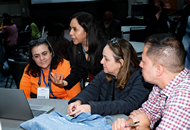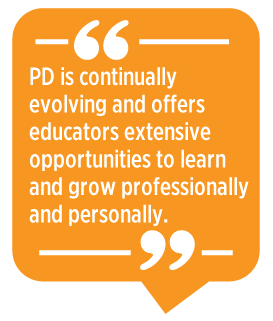10 Trending Professional Development Topics in ELT
by Laura Baecher
 When the school year comes to a close, it’s a great
time to look at some of the trends, key topics, and themes in teacher
professional development (PD). The term “trending” can have a negative
connotation, suggesting that an idea is simply a passing fad—but the intention
in this article is to recognize the great responsiveness and energy in our wide
global TESOL community and to remark on how flexible and forward-thinking our
profession is. In so many ways, PD topics in our field are years ahead of other
fields, and in so many institutional contexts, the English language teaching
(ELT) professionals are the vanguard of change and positive growth.
When the school year comes to a close, it’s a great
time to look at some of the trends, key topics, and themes in teacher
professional development (PD). The term “trending” can have a negative
connotation, suggesting that an idea is simply a passing fad—but the intention
in this article is to recognize the great responsiveness and energy in our wide
global TESOL community and to remark on how flexible and forward-thinking our
profession is. In so many ways, PD topics in our field are years ahead of other
fields, and in so many institutional contexts, the English language teaching
(ELT) professionals are the vanguard of change and positive growth.
This progressive dynamic within the field of ELT
means that PD is continually evolving and offers educators extensive
opportunities to learn and grow professionally and personally. From accessing
ideas via the printed word via blogs, newsletters, books, and journal articles
to sharing information and ideas in videos, webinars, and online conferences,
there is an abundance of PD available 24 hours a day, 365 days a year. Many
topics continue to surface year after year, as these relate to ever-relevant
topics, such as developing materials, integrating content and language
objectives, or addressing the needs of young learners.
 Apart from these familiar topics, and in no
particular rank order, here are 10 topics that have appeared frequently in the
TESOL community. To arrive at the list, I reviewed a number of publications,
including the program books from several ELT organizations, news and blog
posts, and English language teacher newsletters. (Note: Accessing the
conference program book after a conference is completed can be a useful
strategy to keep your finger on the pulse of what is of high relevance to
educators in any given year.)
Apart from these familiar topics, and in no
particular rank order, here are 10 topics that have appeared frequently in the
TESOL community. To arrive at the list, I reviewed a number of publications,
including the program books from several ELT organizations, news and blog
posts, and English language teacher newsletters. (Note: Accessing the
conference program book after a conference is completed can be a useful
strategy to keep your finger on the pulse of what is of high relevance to
educators in any given year.)
Following are the topics that appeared quite
often.
10. Overcoming Teacher Burnout
PD in this area focuses on recognizing the stress
teachers are living in on a daily basis, approaches to self-care, and finding
ways to create better structures within schools so that teachers can address
dilemmas that are within their locus of control.
To learn more, read:
9. Mindfulness
PD in this area focuses on social-emotional
learning; student, teacher, and staff well-being; and intentionally creating
space in the curriculum for learning about ourselves and implementing routines
and practices that promote self-awareness and positive ways to collaborate with
others.
To learn more, read:
8. Culturally Sustaining Pedagogy
PD in this area focuses on identifying our own
biases and identities as teachers, and then learning more and celebrating
students’ home cultures, languages, and experiences and seeing these as
resources upon which to build curriculum and classroom community.
To learn more, read:
7. Translanguaging
PD in this area focuses on challenging monolingual
assumptions (like English-only policies) and strategically and thoughtfully
creating classrooms tapping into the research that shows that home languages
are a powerful resource for learning content and developing English language
skills.
To learn more, read:
6. LGBTQ+
PD in this area focuses on curricular,
programmatic, and policy decisions that can support English learner students
and educators who identify as members of the LGBTQ+ (lesbian, gay, bisexual,
transgender, queer/questioning, among other sexualities) community, to ensure
their voices are heard and to address stereotypes, bias, and microaggressions
to make for more inclusive classrooms and workplaces.
To learn more, read:
5. Formative Assessment
PD in this area focuses on how to move away from a
testing culture to one in which ongoing, low-stakes assessment informs
teachers’ understanding of learners’ progress and the impact of their
curriculum in order to make in-the-moment adjustments, with consideration of
“ungrading” and other approaches that emphasize self-assessment over
testing.
To learn more, read:
4. Creativity
PD in this area focuses on how to spark creativity
in learners by making classroom activities more language-rich through setting
up tasks that are high engagement, open ended, novel, and use approaches from
theater education and the arts.
To learn more, read:
3. Technology for Communication
PD in this area focuses on using the availability
and access of online conferencing and collaborative writing tools to connect
English learners from different parts of the world.
To learn more, read:
2. ChatGPT/AI
PD in this area focuses on how to understand the
ways in which artificial intelligence platforms such as ChatGPT are changing
the nature of writing assignments and the assessment of writing in English
learning contexts, with an emphasis on capitalizing on and incorporating these
tools into teaching and student work rather than resisting them.
To learn more, read:
1. Teaching in the Postpandemic Era
PD in this area focuses on changes in workplace
environments, use of curriculum and technology, applicability of previously
adapted learning frameworks, and how to reengage both students and teachers in
face-to-face instruction as well as continuing to utilize distance
learning.
To learn more, read:
Questions to Ask Yourself
As you plan your professional development for the
upcoming school year, ask yourself these questions:
- Which topics do you want to learn more about?
-
Which topic do you believe should be a focus of
your institution’s PD agenda?
NOTE:
A version of this article first appeared in the TESOL
Blog, 22 December 2022.
Dr. Laura
Baecher is professor of TESOL at Hunter
College, City University of New York. Her research interests and publications
relate to teacher education, including educational technology in teacher
learning, observation and coaching for English language teaching, and
professional development in TESOL. Her recent books are Using
Video to Support Teacher Reflection and Development in ELT
and Reflecting
on Problems of Practice in TESOL. She has served as chair
of TESOL International Association’s Teacher Education Interest Section, an
English language specialist for the U.S. Department of State, and president of
the New York State TESOL affiliate.